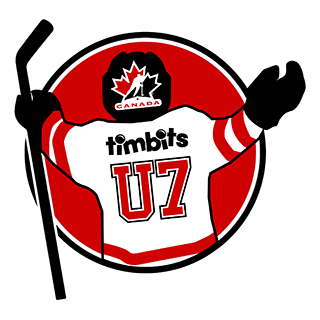
Hockey Canada developed the U7 Program to make the first contact with hockey a safe and positive experience. It is a structured, learn-to-play hockey program designed to introduce beginners to the game's basic skills. It enables participants to become contributing members of a team effort, develop self-confidence, and experience a sense of personal achievement. These goals are achieved in an atmosphere of fun and fair play.
The Hockey Canada U7 Program is designed for players five and six years old, but is suitable for any entry-level hockey player and clearly lays out how to get them started in hockey so they will have fun, learn skills and develop confidence.
U7 Program Core
- 1. The U7 Program is a progressive, learn-to-play teaching curriculum. Children learn through participating in practice drills and informal modified games.
- The program consists of four phases of instruction, designed for any entry-level hockey player, which introduce the skills of skating, passing, puck control and shooting in a progressive, one-step-at-a-time manner.
U7 Program Objectives
- A comprehensive program for the development of young children as hockey players.
- The focus is on skill development and fun without the pressures of winning.
- It aims to create participants and instructors who will continue in the game.
- The motto is Fun, Fitness and Fair Play.
HEO U7 Mentor
Ruggles Pritchard, HEO U7 Program Coordinator
Once a player and coach in Belgium and senior hockey in B.C., Ruggles has coached and taught extensively since then. He's coached high school hockey and numerous other sports. Of late, he has assisted minor organizations in establishing development programs and taught the U7 Program. He has been an HEO instructor and clinic facilitator for a number of years with work in the Coach 1, Coach 2 and Development I clinics.
Resources
- Hockey Eastern Ontario Player Development Pathways Framework
- HEO U7 Policy
- U7 Resource Guide
- LTPD Manual
- LTPD Pyramid
- U7 Core Skills
- U7 Skills Evaluation
- Hockey Canada's U7 Site
- U7 Admin Workshop
- U7 Messenger Guide
- Cross Ice Hockey and SAGs
- Cross Ice Hockey Benefits
- Cross Ice Hockey Study
- Hockey Alberta U7 Skating Study
- U7 Player Pathway
- U7 Introduction Session 1
- U7 Introduction Session 2
- U7 Introduction Session 3
- U7 Introduction Session 4
On-Ice Helpers
Each year more and more young people are interested in volunteering with our amateur hockey programs. Most are adolescents who want to collect high school volunteer hours. Others are young adults looking to take on different roles in hockey.
This has left associations and leagues asking themselves important questions. How old should these new, young volunteers be? What equipment must they wear? What training do they require? Etc.
Team officials must use sound judgment when selecting a young person as an on-ice helper. Specifically, these decisions must be made from developmental and support perspectives. These new “helpers” need to learn to provide assistance to other team officials. It is not an opportunity for older players to get extra ice time.
To provide guidance while ensuring safe opportunities for our young “helpers”, please apply the following:
- An individual who volunteers in an association must be (this ensures that insurance coverage has been secured):
- A Hockey Canada registered player of a minor hockey association or junior hockey league, or
- A Hockey Canada on-ice official under age 20.
- He/she may only be a demonstrator/helper and is not to provide instruction. He/she may not participate in any activities with the players such as scrimmages or drills.
- The individual must be at minimum one age division higher than the team they are volunteering with. (e.g. a Bantam-aged player may help at the Peewee level). He/she is not permitted to volunteer as an on-ice helper with a team at the same or higher age division.
- The individual must wear, at a minimum, a CSA certified helmet and facial protection (as required by their level of hockey), a BNQ certified neck guard (as required by their level of hockey) as well as hockey gloves and skates. Although this is the Branch’s minimum requirement, the home association/league may mandate full equipment.
- An individual who is not a registered team official and who is 16 years of age or older MUST complete the Respect in Sport on-line e-learning program.
- “On-Ice Helper” is neither a qualification nor a designation to be used in the U7 Program or higher levels. Rather, it is limited to those under age 20 who wish to give something back to the game, perhaps become involved in coaching or obtain high school volunteer credit hours.
Videos
For more videos visit the HEO YouTube Channel.
 Skip to main content
Skip to main content













